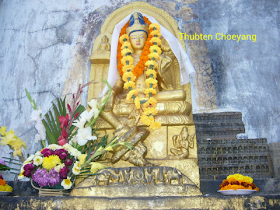When in Buddha hood, one is freed from all mental
obscuration, one is said to attain a state of continuous bliss mixed with a
simultaneous cognition of emptiness, the true nature of reality. In this state,
all limitations on one's ability to help other living beings are removed.
Tibetan definitions of Buddhist
The Tibetan term for Buddhist which is literally and internalist
and more precisely, Tibetans specify two alternative criteria for being
Buddhist:-
a) Formal and having taken refuge
b) In belief and acceptance of the there marks of
existence.
According to tradition, after meditation and the
Buddha concluded that everything in the physical world and everything in the
phenomenology of psychology is marked by these three characteristics and all
phenomena other than Nirvana are marked by three characteristics, sometimes
referred to as the Dharma seals,
that is impermanence dukkha (uneasiness), and anatta (not-self).
Anica (Sanskrit –anitya) All things eventually cease to existence or impermanent
Dukkha (Sanskrit – Duhkha)
Nothing in this physical world or psychologically
realm can bring lasting satisfaction.
Anatta (sankrit – anatman)
All composite, con substantial, phenomenal temporal
things from microcosmic , physical body which are impermanent.
Nirvana
Is peace and termed as other shore from
samsara.
Transmission and Realisation (lungtok, lung-rtogs)
Authenticity of the oral lineage is a prerequisite for realization, hence
the importance of lineages oral transmission is more important than the printed
word derives from the earliest Buddhism, The person from whom one hears the
teaching should have heard it the lineages transmission from Gurus or lamas.
By reading a teaching is helpful but no substitute for obtaining a transmission
of it, and who holds the lineage of transmission making oneself more ready for
realization of such teaching.
Preliminary Practices of Vajrayana
Vajrayana is said to be the fastest method for attaining Buddha hood but it carries the caution that for unqualified practitioners it can be dangerous. Even for a qualified advanced practitioner, to engage in Vajrayana without having received the appropriate initiation or known as empowerment from a qualified lama or Guru.
Without the basis of these three in particular to practice Vajrayana and the guidance from a qualified Guru it can be dangerous just like a kid attempting to ride a vehicle. Without training in the preliminary practices, the ubiquity of allusions to them in Vajrayana is meaningless and even successful Vajrayana initiation becomes impossible.
Dedication of merits
May those who read and sharing of this blog's information be peaceful and joyful. May the Buddha Dharma be flourished and the merits will be dedicated to the sentient beings.


No comments:
Post a Comment
Note: Only a member of this blog may post a comment.